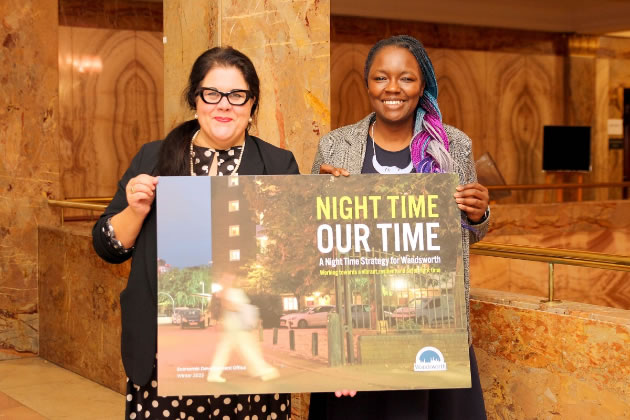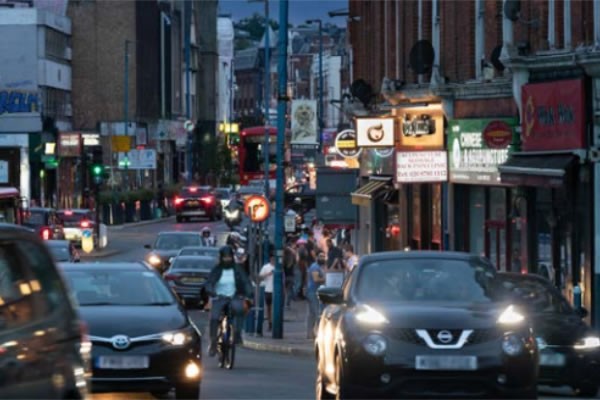Wandsworth Launches its Night Time Strategy
Safety main concern in feedback from Putney and Roehampton

London's night czar Amy Lamé and Councillor Kemi Akinola at the launch of Wandsworth Council's night-time strategy
December 5, 2023
Wandsworth Council has officially launched its new Night Time Strategy at the Town Hall this Friday (1 December).
Night Time, Our Time aims to boost the evening and late night economy while keeping people, particularly women and vulnerable people, safe. It also looks at how t to support night workers, including people working in entertainment, leisure and hospitality businesses, health care, warehouses, deliveries and offices. Read it here.
Wandsworth is the first borough to publish a night time strategy which is a recommendation of the Greater London Authority and the Mayor’s Night Czar Amy Lamé was present at the launch.
The council consulted on a draft of the strategy earlier this year and a report into the responses showed that the main concern of people in Putney and Roehampton was criminality and anti-social behaviour at night which made women and girls feel it was unsafe to go out. Issues were raised about groups of people gathering outside Putney Library and McDonalds, drinking on the streets. Some respondents claimed that between 10pm and 2am the Putney High Street is full of antisocial behaviour, fighting, noise, drug taking and people urinating. It was alleged that local bars do not call the police after incidents of antisocial behaviour due to concerns about a possible licence review.
In Roehampton, some residents felt that everything closed too early on Danebury Avenue and that more cafes, restaurants and commercial units would help encourage people come out in the evening.
Locals said they felt unsafe in several areas across Putney at night including Upper Richmond Road from Putney High Street to Charlwood, and Junction of Putney High Street, Lower Richmond Road and Putney Bridge, and Burston Road, particularly the small street which runs between the office block and post office. Concerns were raised about the level of lighting on Woodlands Way and Wandsworth Park as well as across Roehampton particularly Clarence Lane and the alleyway between Roehampton High Street and Medfield Street. Roehampton residents said they believed crime at night had increased since the Police Station closed. Night workers including supermarket and delivery drivers had reportedly been mugged at the end of their shift.

Some people say they don't feel safe at night in Putney
On public transport people said they had encountered drunken anti-social behaviour on buses and there was a suggestion that security guards should be employed on late night trains. The council strategy will be to encourage more businesses to move to the area and work with existing business to enable them to open later.
The report concludes that for both Putney and Roehampton the council needs to work with police to increase presence in hotspots of antisocial behaviour and areas highlighted as being unsafe. A campaign to discourage drunken behaviour is suggested as well as working with Positively Putney and individual businesses to improve patron behaviour. Better lighting and ‘creative interventions’ could be considered in problematic areas such as parts of Upper Richmond Road, Junction at Putney Bridge and alleyways. Late night safety on buses is to be discussed with TfL.
Other recommendations in the strategy for the whole of the borough include better street lighting, night markets, businesses opening later and calming music at transport hubs.
The authority said in the strategy it must plan for an “inclusive and safe environment” for all residents, visitors and workers following the deaths of Sarah Everard and Sabina Nessa in 2021.
The strategy recommends considering more CCTV and including sexual harassment training as a condition on the licence of new bars. It suggests encouraging cafés, restaurants and bars to “spill out” onto back streets with extra seating, along with offering self-defence training and improving night-time outreach support for rough sleepers, people suffering with mental health problems and women fleeing domestic abuse.
Providing evening childcare, such as night nurseries or in-house crèches, free phone charging points in town centres and night-time social hubs are also among the recommendations. The strategy suggests creating an affordable or free annual night-time programme of events for each town centre, along with trialling night markets, encouraging outdoor murals and installations in town centres and introducing more seating, food markets and dog-owner events in parks. It says day-time businesses and buildings such as schools could hold activities at night to make the most of their space.
The document also puts forward ways to improve night-time transport in the borough, including adding public artwork, calming music and more seating at transport hubs and providing specialist transport services at night for less mobile residents. It also recommends reviewing the frequency and routes of night-time services, creating designated parking bays for delivery drivers and providing timetables at all bus stops.
Deputy council leader Cllr Kemi Akinola said, “We spoke to hundreds of people before finalising our strategy because we know that how you experience the night time depends on who and where you are. We were particularly keen to make sure we got the views of people who may be vulnerable or less likely to get their voice heard, such as women, young people and low-income workers.
“Now we have set out our strategic vision, the work will begin in making sure that we can deliver the quick wins and long-term changes that will make a huge difference.”
Amy Lamé, London’s Night Czar, said, “I am delighted to see the launch of Wandsworth’s new night-time strategy which will help local businesses to thrive, make neighbourhoods feel more welcoming and streets safer for everyone, particularly women and girls, after dark.
“Wandsworth is the first borough to publish their night-time strategy since the GLA's recommendation, and I hope this encourages other boroughs to follow their lead. The Mayor and I are committed to working in partnership with every borough to ensure our high streets, public spaces and workplaces are fair, safe and inclusive at night as we build a better more prosperous London for everyone.”
The council will now put together an action plan and work with partners including the Met Police, Transport for London (TfL), businesses and community groups to take the recommendations forward. It will also consider the strategy when making planning, highways, safety and licensing decisions.
Written with contributions from Charlotte Lilywhite - Local Democracy Reporter